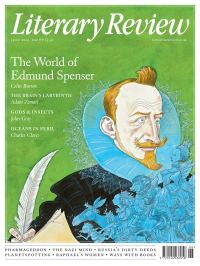Colin Tudge
Selectioneering
Darwin’s Ghosts: In Search of the First Evolutionists
By Rebecca Stott
Bloomsbury 383pp £25
Science is a human pursuit and the history of its ideas, like all human history, is messy; the bigger the idea, the messier its history tends to be. No idea that anyone has had since, say, Muhammad founded Islam, has had more impact than Charles Darwin’s grand notion of evolution by means of natural selection, presented to the world in what he regarded as no more than a sketch in On the Origin of Species in 1859. The idea had its roots in natural history, of course, but also in politics, economics, metaphysics and religion, and has been developed by battalions of thinkers – some generous and humble, some jealous and mean-spirited. It takes great skill and scholarship to tell the story well, and Rebecca Stott does it wonderfully.
Consider how many threads there are in Darwin’s grand idea. First there’s the notion – taken for granted by the mid-nineteenth century, but it took a lot of thrashing out – that there is order in nature at all. It’s obvious to us, perhaps, yet many cultures, including some that

Sign Up to our newsletter
Receive free articles, highlights from the archive, news, details of prizes, and much more.@Lit_Review
Follow Literary Review on Twitter
Twitter Feed
'A charming and amusing personal history'
Don't miss this brilliant @Lit_Review review of #WorldCupFever 👇
@KuperSimon's must-read footballing journey in nine tournaments is out now ⚽️🏆
Michael Taylor - The Beautiful Game
Michael Taylor: The Beautiful Game - World Cup Fever: A Footballing Journey in Nine Tournaments by Simon Kuper; Th...
literaryreview.co.uk
In the summer of 1918, the Caspian port of Baku played host to a remarkable group of Allied soldiers, sent to defend oil wells against the Ottomans.
Anna Reid recounts their escapades.
Anna Reid - Mission Impossible
Anna Reid: Mission Impossible - Mavericks: Empire, Oil, Revolution and the Forgotten Battle of World War One by Nick Higham
literaryreview.co.uk
Alfred, Lord Tennyson is practically a byword for old-fashioned Victorian grandeur, rarely pictured without a cravat and a serious beard.
Seamus Perry tries to picture him as a younger man.
Seamus Perry - Before the Beard
Seamus Perry: Before the Beard - The Boundless Deep: Young Tennyson, Science, and the Crisis of Belief by Richard Holmes
literaryreview.co.uk